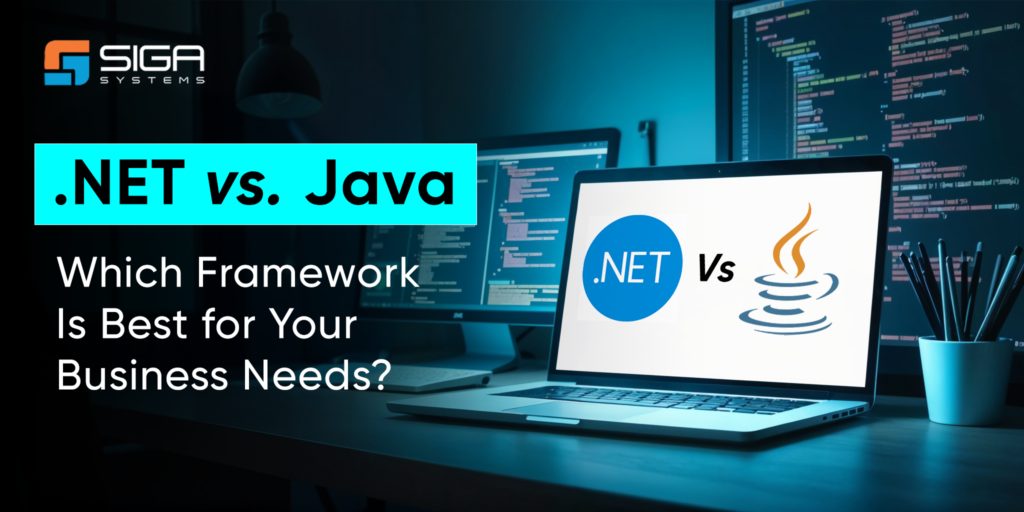In the world of web development, two frameworks stand tall: .NET vs Java. Both of these frameworks have carved out a strong reputation, supporting countless applications across industries worldwide. However, choosing between them isn’t always straightforward. Businesses need to consider aspects like performance, scalability, cost, and compatibility with existing systems before making a decision.
In this in-depth guide, we’ll look at .NET and Java from multiple angles, helping you determine which framework aligns with your business’s specific needs. Whether you’re a front-end developer or back-end developer, or a company like SiGa Systems, specializing in web design and development or offering web development services, this article will walk you through the unique strengths of each framework.
1. Understanding .NET: An Overview
Developed by Microsoft, .NET is a robust framework designed to build a variety of applications, including web, desktop, and mobile. Known for its flexibility, it supports multiple programming languages, with C# being the most popular choice among developers.
The .NET Core release opened up new avenues by making it cross-platform and open-source. This upgrade led to the evolution of the unified .NET 5 and beyond, making it one of the most popular choices for web and application development.
2. Java: A Framework with a Legacy
Java is a seasoned, open-source framework maintained by Oracle and known for its scalability, security, and platform independence. Originating from Sun Microsystems, Java remains one of the go-to options for large-scale and complex applications across platforms. Its Write Once, Run Anywhere capability allows Java applications to run seamlessly across various operating systems, making it a popular choice for enterprise-level web design and development.
3. Platform Compatibility: .NET vs Java
One of the biggest differences between these two frameworks is platform compatibility:
- .NET initially only supported Windows but later expanded to support multiple platforms, thanks to .NET Core.
- Java was designed to be platform-independent from the start, making it easier for developers to run Java applications on virtually any device.
For businesses targeting a multi-platform strategy, Java’s universal compatibility can be a significant advantage, while .NET is ideal for companies already embedded in the Microsoft ecosystem.
4. Programming Languages Supported
The variety of supported programming languages can be a deciding factor for businesses with established development teams:
- .NET: Supports multiple languages, including C#, F#, and VB.NET, making it versatile for various projects.
- Java: Primarily relies on the Java language, with strong support for integration with other programming environments.
If your development team is skilled in C-style languages, .NET offers a diverse and adaptable solution. On the other hand, Java is highly regarded for its consistency and wide support in the open-source community.
5. Performance and Speed
Both frameworks have strengths and weaknesses in terms of performance:
- .NET has evolved to offer high-performance capabilities, especially with .NET Core. It’s known for handling lightweight and heavyweight applications alike, making it suitable for projects with complex functionality.
- Java is well-suited for applications that require extensive memory management, and its Java Virtual Machine (JVM) handles processes efficiently, which can be advantageous for long-running applications.
Businesses like SiGa Systems, known for web development services, might find that .NET’s high-speed processing meets the demands of interactive, modern applications. Meanwhile, Java’s stability and performance consistency continue to make it a reliable choice for enterprise applications.
6. Security Features
Security is crucial in today’s data-sensitive environment. Here’s how both frameworks stand up to security challenges:
- .NET: With its built-in Windows Authentication and other security tools, .NET is ideal for businesses that prioritize security, such as financial and healthcare institutions.
- Java: Known for its robust security frameworks, Java offers several security APIs, encryption tools, and its JVM adds a layer of security, especially valuable for applications handling confidential data.
For businesses like SiGa Systems that might work with sensitive client data, both frameworks provide adequate security, though the .NET framework may have a slight edge due to Microsoft’s focus on enterprise-level security tools.
7. Development Costs: A Breakdown
Cost can significantly influence the choice between .NET and Java:
- .NET: Certain components of .NET, such as Visual Studio Enterprise, come with licensing fees. However, .NET Core is open-source, reducing costs for cross-platform development.
- Java: Java is largely free and open-source, with a vast range of free resources and tools. However, enterprise-level support through Oracle may incur additional costs.
SiGa Systems and other freelance website developers may prefer Java for budget-friendly development, whereas larger companies might opt for .NET if they already have a Microsoft-centered infrastructure.
8. Ease of Learning and Community Support
For businesses considering web development teams with specific skills, the ease of learning and community support available for each framework can make a difference:
- .NET: Visual Studio, Microsoft’s integrated development environment (IDE), simplifies the coding experience. The learning curve is manageable for those familiar with C-style programming.
- Java: Java has extensive community support, with numerous forums, tutorials, and documentation available. The language’s consistent structure makes it easy for developers to adopt new updates or modules.
Both frameworks have dedicated developer communities, but Java’s open-source nature may provide more community-driven resources and frequent updates, which is ideal for those seeking continuous improvement.
9. Front-End and Back-End Development Compatibility
For a company like SiGa Systems, which handles both front-end and back-end development, compatibility with front-end frameworks and back-end databases is essential:
- .NET: Provides seamless integration with front-end frameworks like Blazor for creating dynamic and interactive web UIs. It’s also highly compatible with Microsoft SQL Server for back-end data management.
- Java: Works well with popular back-end frameworks like Spring and integrates with various databases, including MySQL and Oracle. It’s also compatible with JavaScript frameworks, making it a versatile choice for full-stack development.
If your business relies on front-end web developers and needs an all-in-one solution, .NET’s seamless integration can be beneficial, while Java’s adaptability offers diverse solutions for both front-end and back-end requirements.
10. Which Framework is More Scalable?
Scalability is crucial for businesses planning for future growth. Here’s how each framework measures up:
- .NET: Suited for both small- and large-scale applications, particularly those using Microsoft’s Azure cloud services.
- Java: Renowned for its scalability, especially in enterprise environments, Java can handle large, complex applications with ease.
For a business like SiGa Systems that may handle large-scale web development projects or applications with high-traffic volumes, Java’s reputation for scalability makes it a great choice.
11. Which Framework Works Best for Cloud Integration?
With cloud adoption on the rise, businesses are seeking frameworks that support cloud integration:
- .NET: Integrates seamlessly with Microsoft Azure, offering strong support for cloud-based solutions and DevOps practices.
- Java: Java supports cloud integration well, with compatibility across platforms like AWS, Google Cloud, and IBM Cloud.
If your business is heavily invested in cloud-based operations, .NET’s Azure compatibility can be a major advantage, while Java’s flexibility offers cross-platform cloud support.
Conclusion
Choosing between .NET and Java boils down to understanding your business’s unique needs and technical requirements. .NET is well-suited for organizations within the Microsoft ecosystem, offering excellent security, performance, and cloud integration, making it ideal for SiGa Systems providing web development services.
Meanwhile, Java continues to be a top choice for large, complex applications with its platform independence, scalability, and active community. Whether you’re a front-end web developer or a freelance website developer, both frameworks have the resources, support, and flexibility to power modern applications and websites.When selecting a framework, consider the skills of your development team, the platform requirements, and the long-term vision of your business. Both .NET and Java will continue evolving to meet the demands of today’s digital landscape, ensuring each remains relevant for companies seeking reliable, high-quality frameworks.
Author- @Yogesh Kanungo.


